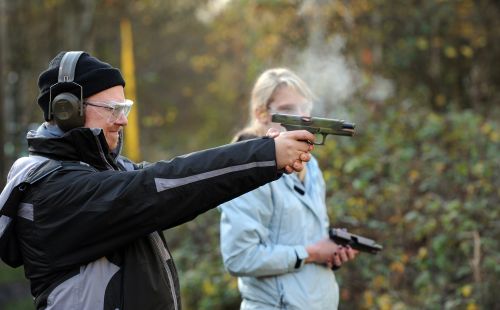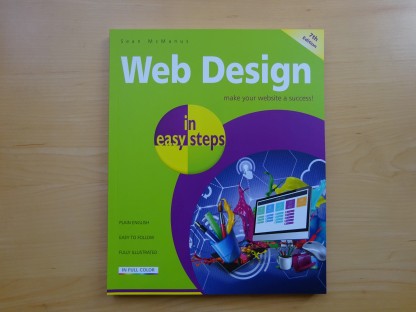
Coding Compendium
A free 100-page ebook collecting my projects and tutorials for Raspberry Pi, micro:bit, Scratch and Python. Simply join my newsletter to download it.
April 2012
How can journalists stay safe when covering conflict, at home or abroad? Sean McManus took an intensive training course to find out. GSOH essential. Photos by Sam Bagnall.
Any moment now we might be ambushed. We're driving to the embassy on a dusty road that twists through the woods, and we've been warned there are rebels out there. The pistol sits heavy in my hand, with the safety catch off, ready to fire.
As we drive, I try to focus on the passing forest, watching for any threat; but we drive fast, and the Range Rover bumps all over the road, making it hard to see clearly what's out there. My pulse is already high, and we've only really gone for a drive in the woods.
Then there's a road block, with a man in camouflage holding a large black gun beckoning us towards him. Our driver drives on.
It doesn't feel right. "Are you sure about this?" I ask.
"Yeah. It's okay. He's beckoning us."
But before we've gone far, the man falls to his knee, slings his gun around, aims at us and starts firing.

In an instant, our driver opens his door, crouches behind it and returns fire. I open my door and run, away from the vehicle, my heart pumping fast. I take cover in bushes at the side of the road, without worrying about the thorns there. On the other side of the road, I can see Rebekah, the other journalist, has done the same. We both fire our pistols at the attacker, and give our driver the cover he needs to run away from the vehicle, and beyond us, where he shelters in the bushes. He lays down covering fire while we run back past him, and then we cover him while he runs. We take it in turns like this until we've escaped the danger. The whole thing probably takes less than a minute, but it feels much longer.
It's a training exercise, but when the guns flash and bang, and you're running for cover, it feels very real. The site itself is based around an old ammunition bunker, which has pencil markings on the wall dated around the time of the Second World War.
"In theatre, journalists wouldn't have guns," says Phil, our driver. "But it's important to know what might happen and how we would respond, so that it's as easy as possible for us to protect you. Otherwise, you're a deadweight."

The training day included pistol training. (That's me on the left).
He's one of the ex-military professionals at Blackdown UK, a training organisation that teaches hostile environment, leadership, and team building skills. He has seven years' experience with the British forces working "where it's warm", but further details remain secret.
Ben, co-founder of Blackdown UK, has extensive experience in close protection teams with the British forces, looking after VIPs. "I wanted to bring a basic awareness of how things operate in theatre, so that people can learn how to get out of a situation that doesn't go as planned," he says.
You don't have to enter a war zone to find yourself facing danger. Last summer's riots put many journalists in potentially dangerous situations on their own soil, and any peaceful protest could turn nasty. "You've got to keep your eyes open and understand the mood of the crowd," says Ben. "Know where you should be and where you shouldn't be. For journalists, the balance is the same as for soldiers. You have to balance where you need to be to do the job, with where you'd least like to be."
When you're working overseas, it's particularly important to research the environment and culture you will be working in. "In the Middle East or Africa, the culture is so different," says Ben. "People shoot rounds in the air, but they're not trying to kill you. You need to know when not to react, as well as when to react."
"Understand what the usual thing is so you know when something unusual happens," he adds. "Know your key routes to the embassy, hospital or other safe house. It sounds silly to say it, but don't look like a tourist. Don't walk around with a huge map. Some of this might seem obvious, but when you're overseas, the adrenaline kicks in and staying safe is about having a mindset of being prepared more than anything else."
I ask Ben what it takes to be a war reporter. "It's hard," he says. "Everyone deals with situations differently. You need a good sense of humour. You've got to be able to switch off to some things and be very focused on what your objectives are. Never take yourself too seriously."
He spent six months working in a safe house with no backup, and he says he didn't sleep deeply in all that time. "You're always alert, ready for what might happen. You've got to understand everyone else is going through the same thing in a different way. You can get on each other's nerves and you've got to deal with that."

It takes about 20 seconds to put up a tent using an army basher sheet like this if you know how. This was our attempt before we were given instructions.
The ambush exercise is part of a 90 minute mission in which we storm a building and shoot the hostiles in there. The soldiers play dead when we fire our blanks at them, and we're invincible. I find myself slipping into 24-speak on the radio on more than one occasion, and it's easy to feel gung-ho. But the heightened emotions associated with the exercise make all the lessons highly memorable: we gel quickly as a team, although we only just met, and communicate clearly.
I'm shot a dozen times, though. The most important lesson for me was that if I find myself in an environment as hostile as this, I'll let the professionals do their job, and focus on my own.
An edited version of this article was published in Press Gazette (February 2012). For more information on journalism training, see my tutorials for writers and journalists.
© Sean McManus. All rights reserved.
Visit www.sean.co.uk for free chapters from Sean's coding books (including Mission Python, Scratch Programming in Easy Steps and Coder Academy) and more!

A free 100-page ebook collecting my projects and tutorials for Raspberry Pi, micro:bit, Scratch and Python. Simply join my newsletter to download it.

Web Design in Easy Steps, now in its 7th Edition, shows you how to make effective websites that work on any device.

Power up your Microsoft Excel skills with this powerful pocket-sized book of tips that will save you time and help you learn more from your spreadsheets.

This book, now fully updated for Scratch 3, will take you from the basics of the Scratch language into the depths of its more advanced features. A great way to start programming.

Code a space adventure game in this Python programming book published by No Starch Press.

Discover how to make 3D games, create mazes, build a drum machine, make a game with cartoon animals and more!